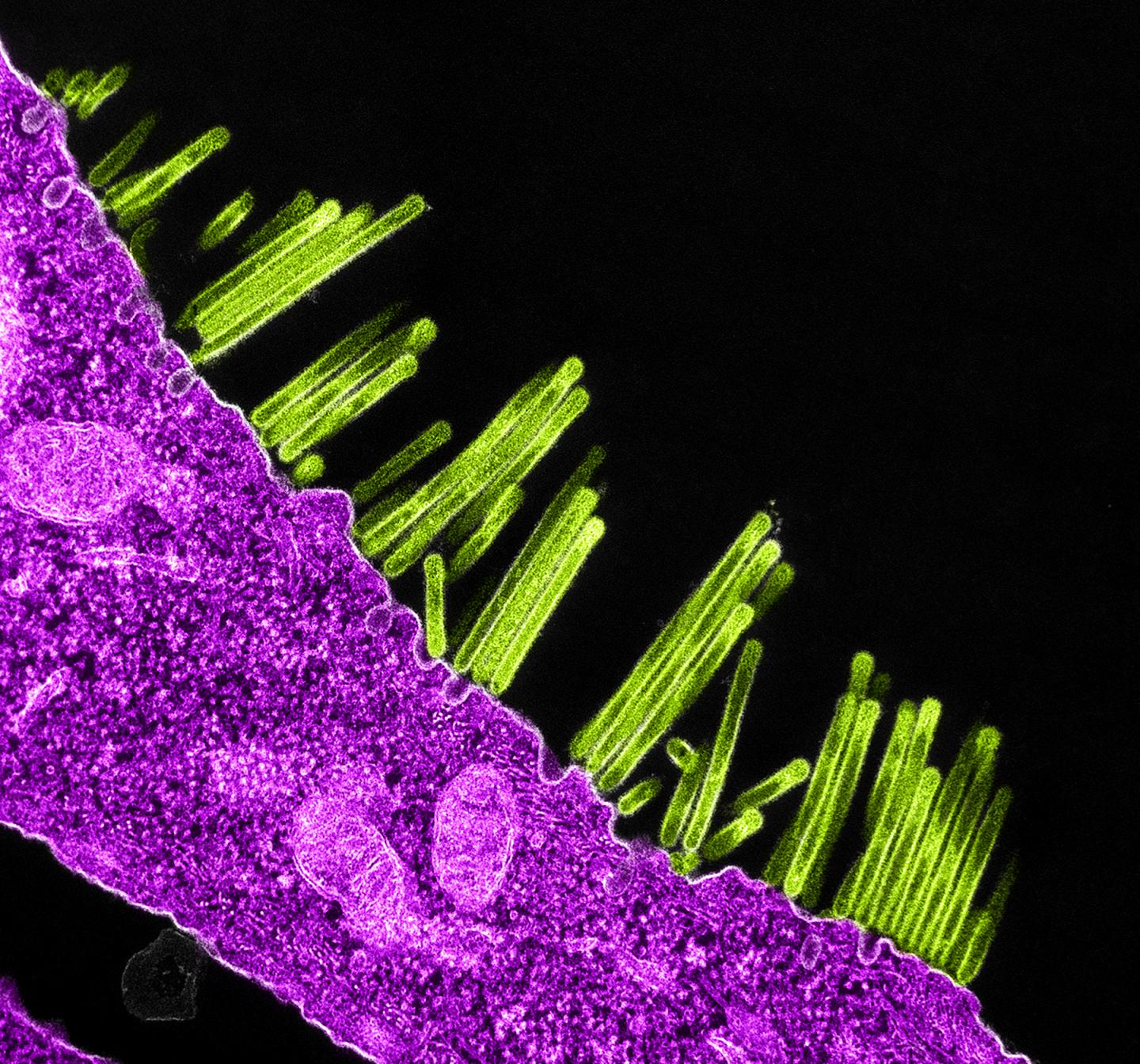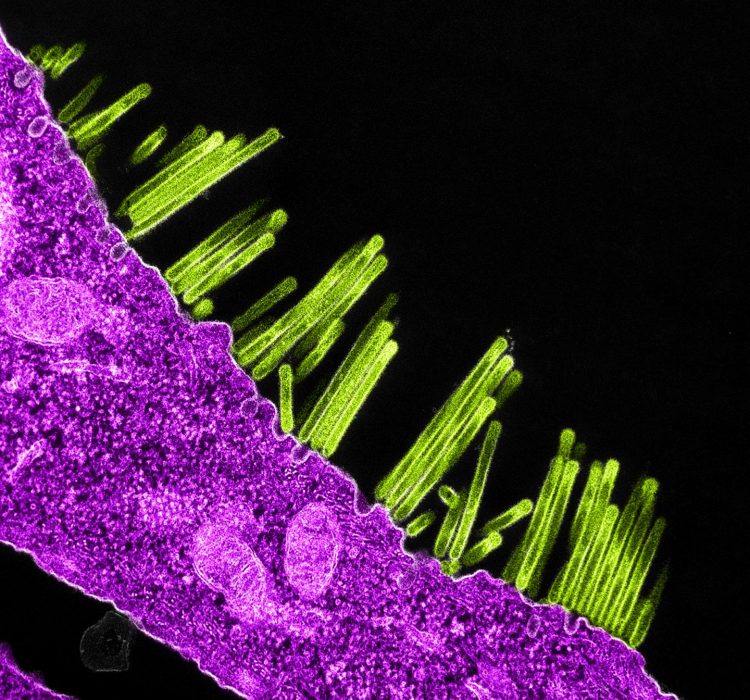
Credit: NIAID
The National Institute of Allergy and Infectious Diseases (NIAID), part of the National Institutes of Health, has initiated the Collaborative Influenza Vaccine Innovation Centers (CIVICs) program, a new network of research centers that will work together in a coordinated, multidisciplinary effort to develop more durable, broadly protective and longer-lasting influenza vaccines. NIAID will provide up to approximately $51 million in total first-year funding for the program, which is designed to support the CIVICs program centers over seven years.
“To more effectively fight influenza on a global scale, we need better influenza vaccines that are more broadly protective,” said NIAID Director Anthony S. Fauci, M.D. “With the CIVICs program we hope to encourage an exchange of ideas, technology and scientific results across multiple institutions to facilitate a more efficient and coordinated approach to novel influenza vaccine development.”
Seasonal influenza causes hundreds of thousands of hospitalizations and tens of thousands of deaths in the United States each year, according to the Centers for Disease Control and Prevention. While current seasonal influenza vaccines are widely available and provide important public health benefit, they could be improved. Notably, they do not always protect against all strains of circulating influenza viruses. Each year, months ahead of the flu season, scientists must make their best prediction as to which circulating viruses will be dominant. New seasonal influenza vaccines must be manufactured, distributed and administered to keep up with constantly evolving influenza viruses. This process can be slow, and if a drifted seasonal influenza virus emerges, that can impact the effectiveness of the vaccine against that virus. The relatively long timeline for vaccine production and the rapidly changing nature of influenza viruses poses a unique and difficult public health challenge for these reasons.
The CIVICs network will develop so-called universal influenza vaccines, which could provide longer-lasting protection than current vaccines and against a wider variety of influenza viruses. The CIVICs centers will conduct multidisciplinary research that supports the development of vaccine candidates through testing in preclinical studies, clinical trials and human challenge studies. The CIVICs network also will explore approaches to improve seasonal influenza vaccines, such as by testing alternative vaccine platforms or incorporating new adjuvants (substances added to vaccines to boost immunity). These advances could substantially reduce influenza hospitalizations and deaths in the future.
The CIVICs program will include three Vaccine Centers, one Vaccine Manufacturing and Toxicology Core, two Clinical Cores, and one Statistical, Data Management, and Coordination Center (SDMCC).
The Vaccine Centers will focus on designing novel vaccine candidates and delivery platforms with an emphasis on cross-protective vaccine strategies that could be used in healthy adults as well as populations at high risk for the most serious outcomes of influenza, such as children, older adults, and pregnant women. The Vaccine Centers also will focus on new ways to study influenza viruses and the human immune response to them through computer modeling, animal models and human challenge trials.
The most promising candidate vaccines will advance to clinical trials conducted by the Clinical Cores. Vaccine candidates will first be evaluated for safety and immunogenicity in small Phase 1 clinical trials conducted among healthy adult participants. Successful vaccine candidates may eventually be advanced to larger Phase 2 clinical trials in healthy adults, or in specific age groups or at-risk populations. The Vaccine Manufacturing and Toxicology Core will work with the Vaccine Centers to develop and manufacture the vaccine candidates for clinical testing.
The CIVICs centers will regularly consult the SDMCC for assistance in designing statistically sound preclinical experiments and clinical trials. The SDMCC also will perform data analyses, make results available across the CIVICs program and ensure that data is available in publicly accessible databases. In doing so, the SDMCC will ensure that the network functions as a collaborative unit, with standardized study protocols and reporting procedures at every step.
The recipients of the CIVICs awards are as follows:
Vaccine Centers:
Icahn School of Medicine at Mount Sinai
Principal Investigators: Florian Krammer, Ph.D. (at the Icahn School of Medicine at Mount Sinai), and Rafi Ahmed, Ph.D. (at Emory University)
Duke University
Principal Investigator: Michael Moody, M.D.
University of Georgia
Principal Investigators: Ted Ross, Ph.D. (at the University of Georgia), and Stacey Schultz-Cherry, Ph.D. (at St. Jude Children’s Research Hospital)
Vaccine Manufacturing and Toxicology Core:
Duke University
Principal Investigator: Matthew Johnson, Ph.D.
Clinical Core:
University of Maryland School of Medicine
Principal Investigator: Kathleen Neuzil, M.D., M.P.H.
Duke University
Principal Investigator: Emmanuel Walter, M.D., M.P.H.
CIVICs Statistical, Data Management, and Coordination Center:
Digital Infuzion, Inc.
Principal Investigator: Stephan Bour, Ph.D.
###
NIAID conducts and supports research–at NIH, throughout the United States, and worldwide–to study the causes of infectious and immune-mediated diseases, and to develop better means of preventing, diagnosing and treating these illnesses. News releases, fact sheets and other NIAID-related materials are available on the NIAID website.
About the National Institutes of Health (NIH): NIH, the nation’s medical research agency, includes 27 Institutes and Centers and is a component of the U.S. Department of Health and Human Services. NIH is the primary federal agency conducting and supporting basic, clinical, and translational medical research, and is investigating the causes, treatments, and cures for both common and rare diseases. For more information about NIH and its programs, visit http://www.
NIH…Turning Discovery Into Health®
Media Contact
Elizabeth Deatrick
[email protected]





